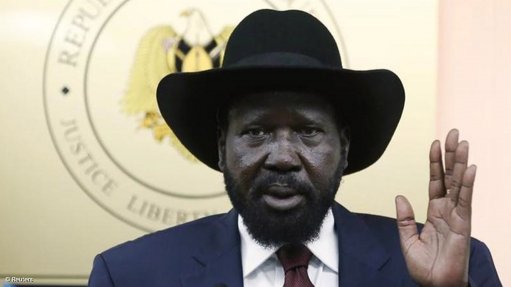
South Sudan President Salva Kirr
Thousands of residents of South Sudan's capital Juba have been celebrating a peace deal struck between President Salva Kiir and rebel leader Riek Machar , which rekindles hope the guns will stop firing.
The second power-sharing agreement deal was signed on Sunday in neighbouring Khartoum after protracted negotiations between the warring factions.
Many of them were at the airport to welcome Kiir back from neighbouring Sudan after the deal with rebel and opposition groups.
The agreement aims to put an end to nearly four years of conflict that has killed tens of thousands, uprooted millions from their homes, and ruined South Sudan's economy.
The deal was signed in the presence of Presidents Omar al-Bashir of Sudan, Yoweri Museveni of Uganda, Uhuru Kenyatta of Kenya, and Ismail Oma Ghuelleh of Djibouti.
"We have to concentrate on the implementation of the agreement and we have to work on uniting our people," Kiir said on Sunday after signing the deal.
The peace agreement has been applauded by some rights activists.
Rights campaigner Beny Gideon Mabor told Al Jazeera the latest deal is a genuine attempt by Khartoum to end the armed conflict in South Sudan .
"Little do people know the roles played by Khartoum in supporting allied militia forces that continue to destabilise South Sudan during the days of liberation struggle and after independence," Mabor said.
"This made Khartoum to be both a referee and a player at the same time, which is impracticable."
But Juba resident Flora Yawa told Al Jazeera that she is cautiously optimistic of the new peace deal.
"When the 2016 fighting happened, we were trapped. So much has changed since the war. My sister lost her husband and we also lost another relative. We couldn't do anything. We just headed home. Now we just want peace," she said.
Power-sharing
A new power-sharing agreement stipulates there will be 35 ministers in the bloated transitional government, including 20 Kiir allies and nine supporters of Machar, along with representatives of other rebel factions.
The rival groups have three months to form a transitional government under the new format, once a final peace deal is signed.
The agreement will see Machar return to his post as the first of five vice presidents under a transitional government of national unity.
"Not everyone who is fighting has been involved in the process of Khartoum, and not everyone who signed appears to be fully representative of their own parties as well," Aly Verjee, a visiting researcher at the United States Institute of Peace, told Al Jazeera.
The rival groups have also already agreed on a permanent ceasefire and withdrawing of their forces from civilian areas.
Deo Gumba, a researcher at the Institute for Security Studies in Kenya, told Al Jazeera addressing the interests of ethnic groups is vital in implementing the deal.
"Each one of those ethnic groups is going to want a very good share of the cake, and I think if that is not carefully planned and carefully done, it is likely to cause a lot of problems," Gumba said.
Collapsed deals
A similar power-sharing deal fell apart in July 2016 when fighting erupted in the capital and Machar fled the country.
Residents of Juba are, however, hoping for the latest deal to succeed.
Kiir said last week the new peace agreement mediated by Sudan and East African nations would not collapse because it was not imposed by outsiders.
He blamed external pressure for the collapse of previous deals.
Some smaller opposition groups say they have doubts about the new deal because it does not allocate power fairly.
Two groups, the People's Democratic Movement (PDM) and National Salvation Front (NAS), have distanced themselves from the agreement.
But analysts say it is more accommodating than previous deals.
"This agreement was negotiated in almost all the four main cities of this region - that makes it a little bit different from the rest, although it is the same in letter," Gumba said.
Economic recovery
South Sudanese people are hoping economic stability can return.
Years of conflict have ruined an already widely impoverished economy that heavily relies on crude oil production.
Neighbouring Sudan is also feeling the economic pinch since Juba seceded in 2011, taking with it three-quarters of its oil output.
Khartoum also relies on Juba to pump crude through an export pipeline to increase oil output.
"Khartoum has no choice but to willfully give up its support for armed groups and choose the path of peace so that both countries can secure economic viability," Mabor said.
Khartoum has confirmed oil would be pumped from South Sudan's Wahda region to Sudan beginning on September 1.